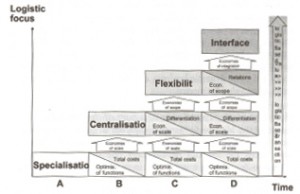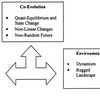 Logistics is no longer what it used to be and logistics today plays a much more important and strategic role than it did in the past. In his article on the Role of Logistics in Corporate Strategy in the book Northern Lights in Logistics, Mats Abrahamson from the University of Linköping, Sweden, describes describes logistics as having evolved from transaction-based logistics to value-based logistics in four stages.
Logistics is no longer what it used to be and logistics today plays a much more important and strategic role than it did in the past. In his article on the Role of Logistics in Corporate Strategy in the book Northern Lights in Logistics, Mats Abrahamson from the University of Linköping, Sweden, describes describes logistics as having evolved from transaction-based logistics to value-based logistics in four stages.
The evolutional development of logistics
Abrahamson describes the evolution of logistics (or the evolution of supply chain management if you wish) as having gone through four phases: 1) optimization of flows and specialization of tasks, 2) economies of scale with centralization of tasks, 3) economies of scope with flexibility in tasks, and 4) economies of integration with tasks interfacing directly with the end customer. This, he says, has readied the ground for an agile and “opportunity-driven” supply-chain.
Specialization
This has always been the base in logistics and refers to functional optimization in warehousing and transportation.
Economies of scale
Increased demand for logistics services and the need for cost-reductions leads to the centralization of warehouses and terminals.
Economies of scope
Standardization and cost-efficiency results in a rigid logistics system, where the demand for differentiation forces the development of a flexible system.
Economies of integration
Shifting focus from the mere logistics to a supply chain perspective opens up a new interface, the end customer (or first supplier) where supply chain views and logistics views meet and intersect.
Reference
Abrahamson, M. (2008). The Role of Logistics in Corporate Strategy. In J. S. Arlbjørn, A. Halldorson, M. Jahre & K. Spens (Eds.), Northern Lights in Logistics & Supply Chain Management (pp. 49-63). Copenhagen: CBS Press. Copyright note: The image used in this post is taken from the above book.
Author link:
- liu.se: Mats Abrahamson
Related
- husdal.com: Is there a Nordic approach to logistics?













